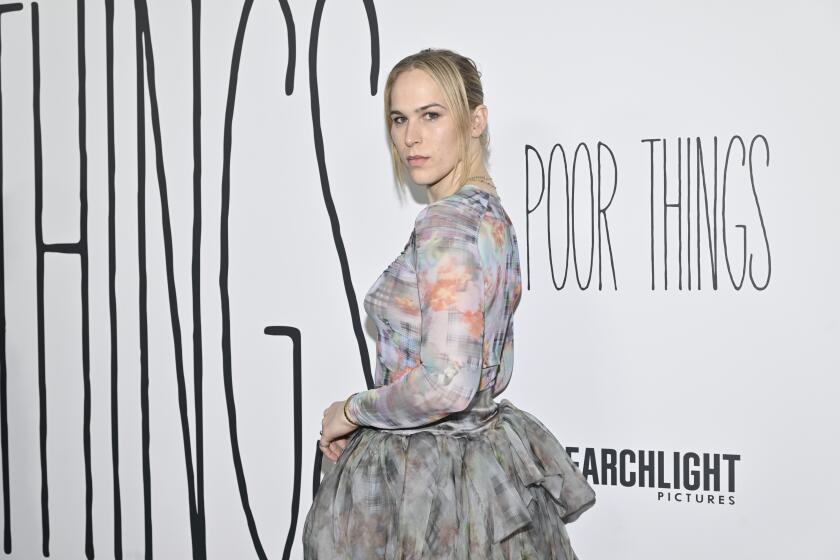ADVOCACY GROUP SAYS TV HAS LITTLE RESPECT FOR RELIGION
The Parents Television Council, a conservative advocacy group that has been at the forefront of the national debate over media decency, is for the first time in seven years turning its attention to the portrayal of religion on TV.
Leaders of the council, along with the National Religious Broadcasters, on Thursday released a study of prime-time programming that they say shows that Hollywood “has virtually no respect for religion.”
For the record:
12:00 a.m. Dec. 24, 2004 For The Record
Los Angeles Times Friday December 24, 2004 Home Edition Main News Part A Page 2 National Desk 4 inches; 144 words Type of Material: Correction
Television and religion report -- A Dec. 17 Calendar article about a report by the Parents Television Council criticizing how TV deals with religion included this quote from the organization’s president, L. Brent Bozell: “Is it because Hollywood is Jewish and taking care of its own? No, I don’t think that.” The article added that Bozell, in a follow-up interview, “sought to soften his comment” by explaining it was based on what “many would say” and was meant as a sarcastic comment, not one he believes. Bozell maintains that in the follow-up interview he was not trying to “soften” the comment but to correct it by providing four words he said were omitted at the end of the reporter’s original transcription of the remark: “as some would say.” The quotation as originally printed was repeated in the “Regarding Media” column in Saturday’s Calendar section.
PTC President L. Brent Bozell said during a news conference with reporters that he believes Hollywood is out of touch with the majority of Americans.
“Is it because Hollywood is Jewish and taking care of its own? No, I don’t think that,” Bozell said. “In the general public and in Hollywood, there is an understanding that respect is owed to Jews. It’s as simple as that. That same respect ought to be paid to other faiths as well.”
In a follow-up interview with a Times reporter, Bozell, who is Catholic, sought to soften his comment when asked about his reference to Hollywood as “Jewish.” He said it was based on what “many would say” and was meant as a sarcastic comment, not one he believes.
The Parents Television Council was a major force in the public outcry over Janet Jackson’s breast-baring Super Bowl halftime dance earlier this year. By the organization’s own estimate, a quarter of the 530,828 complaints that poured in afterward came from PTC members or those informed of the performance by the group’s e-mail alert.
Bozell said the group had no similar activity in mind on the topic of religion on TV but promised to take its findings to advertisers.
“We will encourage advertisers to get behind those in the industry who want to do more positive story lines than what they’ve been doing. That won’t be new,” he said.
He said Hollywood is missing out on a marketing opportunity by ignoring the majority of Americans who, according to a 2003 Harris poll cited by the study, are Christian. Ninety percent said they believed in God, and 80% said they believed in the resurrection of Jesus Christ.
“They’re blinding themselves, not seeing the forest for the trees when they dismiss the fact that this country is fed up with Hollywood’s assault on families,” Bozell said of TV writers, producers and executives. “Nobody, but nobody, saw the success of ‘The Passion of the Christ’ coming. They don’t understand there’s a hunger for positive messages.”
The report, “Faith in a Box: Entertainment Television and Religion,” is the sixth PTC study to look at religion on TV. The last one, from 1997, showed fewer but more positive treatments of religion.
The PTC study, put out in partnership with the National Religious Broadcasters, counted 2,344 treatments of religion -- such as mention of prayer or the presence of God -- from September 2003 to September 2004 and deemed 24.4% of them negative. Most were neutral and 22.1% were positive.
Frank Wright, president of the NRB, called negative portrayals of religion on television “dehumanizing” and compared them to representations of Jews prior to the Holocaust and blacks in the era of slavery.
“Systematic negative portrayals of groups of people are always disturbing,” Wright said. “They produce the potting soil that leads to persecution.”
The PTC study calls NBC “by far the most anti-religious network,” with 9.5 negative treatments for every positive one. Fox had 2.4 negatives for each positive. At the other end of the spectrum was Pax, which the council said had 90.7% positive depictions of religion. CBS was deemed more positive than negative by a margin of 2 to 1.
NBC issued a statement from New York: “Having not seen the content analysis, we cannot comment on the study itself, though we reject its conclusion. Our programming reflects the diversity of our audience, which averages more than 10 million viewers per night and included more than 200 million viewers during the Olympics.”
The network added, “It is never our intention to appear, nor do we accept the notion that we are, ‘anti-religious.’ ”
Spokespeople for CBS, UPN, Fox and the WB said their networks declined to comment. ABC said it had not seen the study and could not comment.
Many positive portrayals cited in the study came from CBS’ “Joan of Arcadia,” a series about a teenage girl who converses with God. In one episode, when Joan is found skipping class with the cheerleaders, God tells her that he told her to join the squad, not skip class.
Another positive example of religion on TV cited was an episode of CBS’ “JAG” in which a woman prayed for a man’s safety and also asked God to say hello to her deceased mother and tell her that she loves her.
A negative example was ABC’s “31st American Music Awards,” when host Jimmy Kimmel gave the audience a brief list of rules. “And finally,” he said, “and this is a personal thing, no thanking God. God does not watch television. And if he did, He would not be watching this show. He would be watching ‘Tarzan’ on the WB.”
In another negative example, from NBC’s “Will & Grace,” the character Karen tries to cheer up Grace by saying, “Let’s go buy that historic church and turn it into a gay bar.”
In the telephone news conference, Wright blamed the negative portrayals on Hollywood’s creative community, which he said is unfamiliar with the subject of faith.
“It’s a long-standing issue with Hollywood,” he said. “I think the issue has to do with the makeup of persons in Hollywood and their own personal convictions. I believe a low percentage of people in Hollywood consider themselves to be people of faith.”
To obtain the data, PTC analysts reviewed prime-time programming on the seven commercial broadcast networks. Religious subject matter was divided into one of five categories: faith; institution and doctrine; laity; clergy; and miscellaneous.
Some academics have criticized previous PTC data, saying its definitions are imprecise and they need more coders to check one another’s judgments.
While the PTC focused on the individual networks in programming and religion, the study also showed that overall religious content on prime-time television was balanced with most of it being neither positive nor negative.
PTC director of research Melissa Caldwell said the more specific the religious reference, the more negative it was. The 8 p.m. hour was the most “pro-religion” time slot, with increasingly negative treatments later in the night.
The group’s findings come at a time when Hollywood executives are feeling an increasingly chilly climate for envelope-pushing television. Based largely on PTC complaints, the FCC has levied record fines against media corporations.
Critics say that the online complaints registered by PTC are disproportionate because they reflect the views of a handful of people and do not accurately reflect the overall concerns of American viewers.
Earlier this month, Jarvis reviewed complaints to the FCC against the Fox show “Married by America.” He reported on his site, buzzmachine.com, that 90 online complaints about the show were filed by 23 people. All but two letters were identical and came from a form on the PTC website, Jarvis said. The PTC takes credit for more than 4,000 complaints to the FCC.
The PTC has offices in Alexandria, Va., and in Los Angeles. The council’s Alexandria office shares space with the right-leaning Media Research Center, which Bozell founded.
Of the PTC study, Jarvis said, “Who are they to say what the public wants? They don’t speak for America. Second, what if a lot of entertainment is negative about religion? So what? We have free speech here.”
*
Times staff writer Elizabeth Jensen in New York contributed to this report.
The complete guide to home viewing
Get Screen Gab for everything about the TV shows and streaming movies everyone’s talking about.
You may occasionally receive promotional content from the Los Angeles Times.



